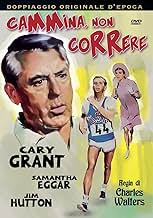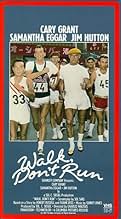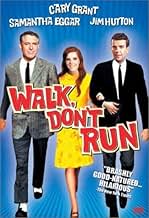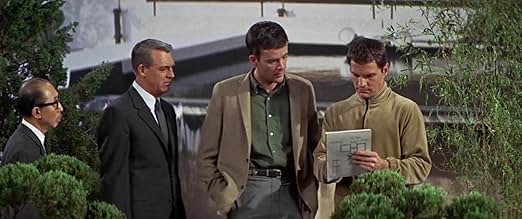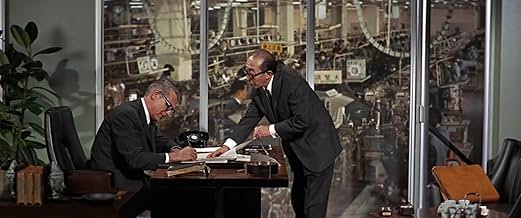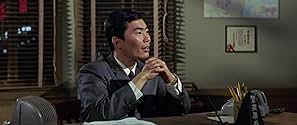During the housing shortage of the Summer Olympic Games in 1964, two men and a woman share a small apartment in Tokyo, and the older man soon starts playing Cupid to the younger pair.During the housing shortage of the Summer Olympic Games in 1964, two men and a woman share a small apartment in Tokyo, and the older man soon starts playing Cupid to the younger pair.During the housing shortage of the Summer Olympic Games in 1964, two men and a woman share a small apartment in Tokyo, and the older man soon starts playing Cupid to the younger pair.
Holger Abro
- Swedish Athlete
- (uncredited)
Isabel Boniface
- Mexican Athlete
- (uncredited)
Vickey Cason
- Contortionist
- (uncredited)
David Draper
- Swedish Athlete
- (uncredited)
Terry Farnsworth
- Olympic walker
- (uncredited)
Sonja Haney
- Swedish Athlete
- (uncredited)
Sonya Harrison
- American Athlete
- (uncredited)
6.64.9K
1
2
3
4
5
6
7
8
9
10
Featured reviews
One of my favorites, finally on DVD!!
I am a huge Cary Grant fan and in this, his final film, he is charming as usual. Jim Hutton and Samantha Eggar are very good as the victims of his matchmaking. Its predictable but who cares? Its a feel good movie and I give it ***** big stars out of 5.
Decent Light Comedy
Cary Grant's last film is in many ways a typical Grant performance. He does light romantic comedy in this 1 more time. The supporting cast is OK with the late Jim Hutton being the most talented.
The film itself is amusing but kind of rough around it's edges. I am not sure why, but the pace of this film doesn't feel entirely right. Maybe it has to do with Grants advancing age or maybe the Director was trying something new which just doesn't work all the time.
Whatever it is, the chemistry between the actors & actresses suffer & it shows in the film. Granted, this is not supposed to be art though this role for Grant is pretty much typical of his other films. There are a few decent laughs in this one & if you like Cary Grant, enough here to watch.
Don't mistake it with his classic work like in the film North By NorthWest. Call this one way far east.
The film itself is amusing but kind of rough around it's edges. I am not sure why, but the pace of this film doesn't feel entirely right. Maybe it has to do with Grants advancing age or maybe the Director was trying something new which just doesn't work all the time.
Whatever it is, the chemistry between the actors & actresses suffer & it shows in the film. Granted, this is not supposed to be art though this role for Grant is pretty much typical of his other films. There are a few decent laughs in this one & if you like Cary Grant, enough here to watch.
Don't mistake it with his classic work like in the film North By NorthWest. Call this one way far east.
A pleasant end to a great career
Cary Grant's last film is an enjoyable, albeit entirely unnecessary, remake of the classic The More The Merrier. That film starred Joel McCrea, Jean Arthur, and Charles Coburn. Grant play the Coburn role as an older man who tries to play matchmaker to a younger couple he is sharing an apartment with. The couple here are Jim Hutton and Samantha Eggar. Poor substitutes for screen legends McCrea and Arthur but both are likable. The original took place during WW2 so it used the wartime housing shortage as part of the plot. This moves things to Tokyo during the Summer Olympics in order to keep the plot intact of Grant not being able to find a room anywhere else. On the whole, it's an amusing movie but probably much less so if you've seen the original. This is pretty much a scene-for-scene remake with few changes. Grant's a rough fit for the role as it is intended but he does give it his best, using his charm and wonderful screen persona to great effect. He's certainly the best thing about the film and, at all times, my attentions were on him rather than his co-stars. Obviously I would recommend you see the classic 1943 film over this. But, if you have seen that, there's no harm in giving this one a try to see a different cast approach the same story. As far as last films of great stars goes, this could be worse. Just look at some of Grant's contemporaries and you'll see some truly sad ways to end a career. Cary wisely knew to get out while the getting was good. That's a lesson a lot of stars could still learn today.
Near Classic; Breezy and Very Amusing; Cary Grant's Last Comedy
This film was probably launched as a "Cary Grant" vehicle, a remake of "The More the Merrier", but I suggest it is a major comedy for several other reasons. As William Rutland, peer and genial businessman and busybody, Grant is mature and good; but involving him in the housing shortage in Tokyo during the 1964 Olympics was a stroke of near-genius. Adding in the old storyline about a girl planning to marry for money and introducing the right man for her instead, in the persons of Samantha Egggar and Jim Hutton, was better, with Grant acting as matchmaker. But making Hutton a member of the US Olympic team and keeping his event a secret, adding in a comedic Russian spy, the smallness of their shared apartment which Grant sublets to Hutton after wangling his own way in, plus visiting a Japanese household of friend Miiko Taka with Eggar and fiancée John Standing, he of the "tall forehead" and boring personality, was I claim pure gold comedically speaking. Charles Walters directed this satirical comedy in breezy style, with story by Robert Russell and Frank Ross from Sol Saks' and Grason Kanin's inspired story. The cast included besides the principals George Takei as a Tokyo police officer, Ben Astar as Dimitri the bumbling Russian spy, skilled actor Teru Shimada as Taka's father, Lois Kiuchi as her mother, Ted Hartley as Yuri, Hutton's Russian fellow athlete-friend, and hundreds of others in bit parts and small roles. The very genial music for the film by Quincy Jones was low-key and delightful; Henry Mancini supplied songs also; the cinematography by Harry Stradling Sr. was lovely from start to finish; and the production designs by Joseph C. Wright were varied and serviceable through. Outstanding scenes in the narrative include I suggest the way in which Sir William's trousers keep disappearing, the attempt by Grant in underwear to enter the Olympic walking event to obtain a signature on a document from Hutton, the party where Grant suggest to a lady Russian shot putter that she put her derrière somewhere else than in his dinner, the trip to see Eggar's friends (the Kurawa family) and the police station scene, among others. This is a sometimes slick and always amusing and I find frequently very-involving story filled with characters that seem unusually real. It may have begun as a Cary Grant vehicle; but I find Hutton is brilliant, and it became despite a bit of over- lengthy presentation a classic as a romance, a comedy concerning overcrowding and a presentation of very memorable characters whose general theme is how one need to deal with life by means of honesty rather than by taking the seemingly easiest path. A favorite of many, many filmgoers, myself included.
Charming, heartening - a lovely surprise
It was on TV during lockdown, nothing else on, and I was busy pottering around but got quickly drawn in.
There are some absolutely masterful moments, tiny details in the acting and scripting that are reminiscent of a bygone age of film in which love honesty kindness and trust were still understood.
The acting is superb throughout and they all have immense timing and patience to make it even funnier.
An unexpected joy.
Did you know
- TriviaCary Grant (Sir William Rutland) retired from acting after this movie because, at sixty-one, he had become too old to play the romantic lead. Grant, furthermore, did not think his fans would want to see him playing supporting roles.
- GoofsAt the race, Julius says the fastest time for the 50 km race-walk is "four hours and fifty-three minutes." At the time of the 1964 Olympics, the men's 50 km race-walk world record was actually 4:00:50. (At the time of the film's release, the record was 3:55:36.)
- Quotes
Christine Easton: After 7:45, you can have the bathroom all day if you'd like.
Sir William Rutland: I wouldn't know what to do in the bathroom all day!
- ConnectionsFeatured in American Masters: Cary Grant: A Class Apart (2004)
- SoundtracksAn Affair to Remember (Our Love Affair)
(uncredited)
Music by Harry Warren
Lyrics by Harold Adamson and Leo McCarey
Sung by Cary Grant
- How long is Walk Don't Run?Powered by Alexa
Details
Box office
- Gross US & Canada
- $9,810,000
- Runtime
- 1h 54m(114 min)
- Sound mix
- Aspect ratio
- 2.35 : 1
Contribute to this page
Suggest an edit or add missing content



